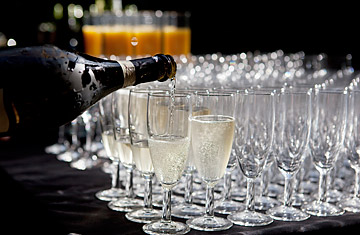

This post is in partnership with Worldcrunch, a new global-news site that translates stories of note in foreign languages into English. The article below was originally published in La Stampa.
PARIS — With the countdown to 2012 officially on, one question looms large — at least in France and Italy: Prosecco or Champagne? For people outside of Europe, choosing which sparkling wine to toast the new year may seem like a minor issue. For Italians and French it is a matter of national pride.
Going into the holiday season, Prosecco — the sparkling wine produced in northwestern Italy — seems to have the edge this year, according to Coldiretti, Italy's largest farming group. Coldiretti reported that in the first nine months of 2011, 200 million of bottles of Prosecco were exported, versus "only" 192 million of bottles of Champagne.
Italians are already claiming victory for its "underdog" Prosecco, which doesn't enjoy the same global name recognition as its more expensive French counterpart. France's Champagne makers, however, aren't quite ready to concede.
"Italians are crowing over a victory. They say their sparkling wine is exported more than Champagne is," read a recent article in the French newspaper Le Parisien. "But French wine makers dispute these data," the paper added.
"We are comparing two wines that cannot really be compared," says Thibaut le Mailloux, communications director for the Comité Interprofessionnel du vin de Champagne, an organization that involves many of the Champagne industry's major players. "Spumante is an obscure denomination of sparkling wine, while Champagne has a guarantee of origin, and is produced in a specific and unique way," he added.
France is also quick to point out that Coldiretti's export stats don't include the final two months of the year, when according to Le Mailloux, 30% of Champagne business takes place. The battle over the New Year's toast, in other words, is not over yet. France's pricier bubbly might still rise to the ocassion.
Our Son Was a Neo-Nazi Terrorist
— Die Welt
Russia Struggles to Lure Expats Home
— Kommersant
Are the Euro's Best Years Still to Come?
— From Die Welt
